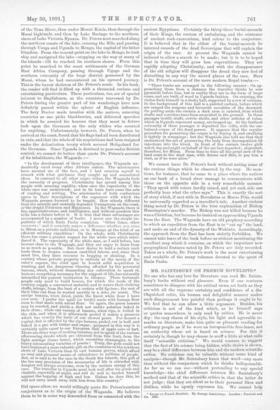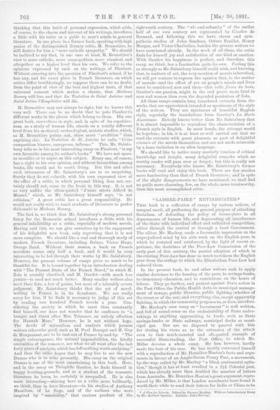MR. SAINTSBTJRY ON FRENCH NOVELISTS.*
No one who has any love for literature can read Mr. Saints- bury's books without real pleasure. Even if one ventures sometimes to disagree with his critical views, set forth as they are with all the supreme certainty and confidence of a dis- trhguished critic, his human and delightful manner makes such disagreement lees painful than perhaps it ought to be. We feel that he can allow a little argument. Besides, hie criticism is not of the kind which, as he himself says or quotes somewhere, is only read by critics. He is never dry : the easy charm of his style, his light and agreeable re- marks on literature, make him quite as pleasant reading for ordinary people as if he were an irresponsible free-lance, not an authority whose art is based on science. For this it certainly is, though he may choose to scoff a little at what calls itself "scientific criticism." We would venture to suggest that the fact of his science being hidden, while theirs is shown, may be a chief difference between him and the modern scientific critics. No criticism can be valuable without some kind of analysis—though Mr. Saintsbury hates that word—any more than without the comparison which he thinks indispensable. As far as we can see—without pretending to any special knowledge—the chief difference between Mr. Saintsbury's method and that of the scientific critics is, that the latter do not judge ; that they are silent as to their personal likes and dislikes, while he openly expresses his. We cannot help " Damp; on French Nov ehete, By George Saintsbury. London, Pereira and. Co. 1851.
thinking that this habit of personal expression, which adds, of course, to the charm and interest of his writings, interferes a little with his value as a guide to men's minds in general literature. In one place, in a former book, speaking with high praise of the distinguished literary critic, M. Brunetiere, he still desires for him a "more catholic sympathy." We should be inclined to say that, in one case at least, M. Brunetiere's view is more catholic, more cosmopolitan, more classical, and altogether on a higher level than his own. We refer to the opinions expressed by each on the writings of Flaubert. Without entering into the question of Flaubert's school, if he has any, and his exact place in French literature, on which critics differ bewilderingly, we suppose there can be no doubt, from the point of view of the best and highest taste, of that universal consent which makes a classic, that Madame Bovary will live, and that La Ten tation de Saint Antoine and Saint Julien l'Hospitalier will die.
M. Brunetiere may not always be right, but he knows this very well. There can be no doubt that he puts Flauber t's different works in the places which belong to them. His one great book, marvellous in style, and, in spite of its repulsive- ness, as a study of human life, stands on a totally different level from his mediteval, archwological, artistic studies, which, as M. Branetike points out, show more " erudition " than anything else. La Tentation de St. Antoine he calls, " Cette composition bizarre, ennuyease, informe." This, Mr. Saints- bury tells us in his most interesting essay on Flaubert, "is my own favourite among its author's books." We have not space to moralise or to argue on this subject. Every one, of course, has a right to his own opinion, and without favouritism among books, life would not be worth living. But this and other such utterances of Mr. Saintsbury's are to us surprising. Surely they do not coincide with his own expressed view of the office of a critic, in which personal liking does not, cer- tainly should not, come to the front in this way. It is not .so very unlike the often-quoted " J'aime mieux Alfred de Musset," which, as Mr. Saintsbury himself says, "is not -criticism." A great critic has a great responsibility. He would not really wish to teach students of literature to prefer Salaam/A to Madame Bovary.
The fact is, we think that Mr. Saintsbury's strong personal fancy for the Romantic school interferes a little with his general infallibility as a critic, especially of modern novels. Having said this, we can give ourselves up to the enjoyment of his delightful new book, only regretting that it is not more complete. We should like a real and thorough study of modern French literature, including Balzac, Victor Hugo, George Sand. Without their names, a book on French novelists seems only half a book, and it would be very interesting to be led through their works by Mr. Saintsbury. However, the present volume of essays gives us much to be thankful for. It is bound together by an introduction dealing with "The Present State of the French Novel," in which M. Zola is soundly chastised, and M. Daudet—with much less justice—is used not much better. Many smaller writers also meet their fate, a few of praise, but more of a tolerably severe judgment. Mr. Saintsbury thinks that the art of novel- writing in France is in its decadence. We are really sorry for him, if he finds it necessary to judge of this art by reading two hundred French novels a year. Con- sidering the society in which he must thus constantly find himself, one does not wonder that he confesses to "a hunger and thirst after Mrs. Trimmer, an unholy affection for Hannah More." However, he is not without hope. The devils of naturalism and analysis which possess writers otherwise good, such as M. Paul Bourget and K Guy de Maupassant, are to be cast out of France by-and-by. "The simple extravagance, the natural impossibilities, the kindly enormities of the romance, are what we all want after the last forty years of analysis, which has left nothing worth analysing." And thus the critic hopes that he may live to see the new Dumas who is to arise presently. His essay on the original Dumas is one of the most entertaining in this book. Here, and in the essay on Theophile Gautier, he finds himself in happy hunting-grounds, and as a student of the romantic literature he loves, he certainly is unequalled. He is also most interesting—shining here as a critic more brilliantly, we think, than in later literature—in his studies of Anthony Hamilton, of Le Sage, and of the authors who were inspired by " sensibility," that curious product of the eighteenth century. The "wit and urbanity" of the earlier half of our own century are repre3ente3. by Charles de Bernard, and following this we have clever and sym- pathetic studies of Jules Sandeau, Octave Feuillet, Henry Murger, and Victor Cherbuliez, besides the greater writers we have mentioned already. In the work of all these, the critic finds for himself joy and satisfaction of one kind or another. With Gautier his happiness is perfect, and therefore this essay, we think, has a fascination quite its own. Feeling this as strongly as Mr. Saintsbury himself could wish, and knowing that, in matters of art, the very mention of morals is heretical, we will yet venture to express the opinion that, in the matter of morals—and the effect of art on people's minds and lives must be considered now and then—this eulte form du beau, Gautier's one passion, might in the end prove more fatal to men and women than even the degraded pessimism of Zola.
All these essays contain long translated extracts from the works that are appreciated, intended as specimens of the style of the writers. They are specimens of beautiful English style, especially the translations from Ga,utier's La Morte Amowreuse. Nobody knowa better than Mr. Saintsbury that it is almost impossible to reproduce the characteristics of a French style in English. In. most hands, the attempt would be hopeless ; in hie, it is at least so well carried out that we read the extracts with great pleasure, as part of delightful r6surags of the novels themselves, and are not made miserable by a lame imitation in an alien language.
We should like to notice many masterly touches of critical knowledge and insight, many delightful remarks which no worthy reader will pass over or forget ; but this is really not necessary. Everybody who knows Mr. Saintsbury's former books will read and enjoy this book, There are fow:studies more fascinating than that of French literature ; and in spite of the slight disagreements we have mentioned, we shall find no guide more charming, few, on the whole, more trustworthy, than this most accomplished critic.







































 Previous page
Previous page